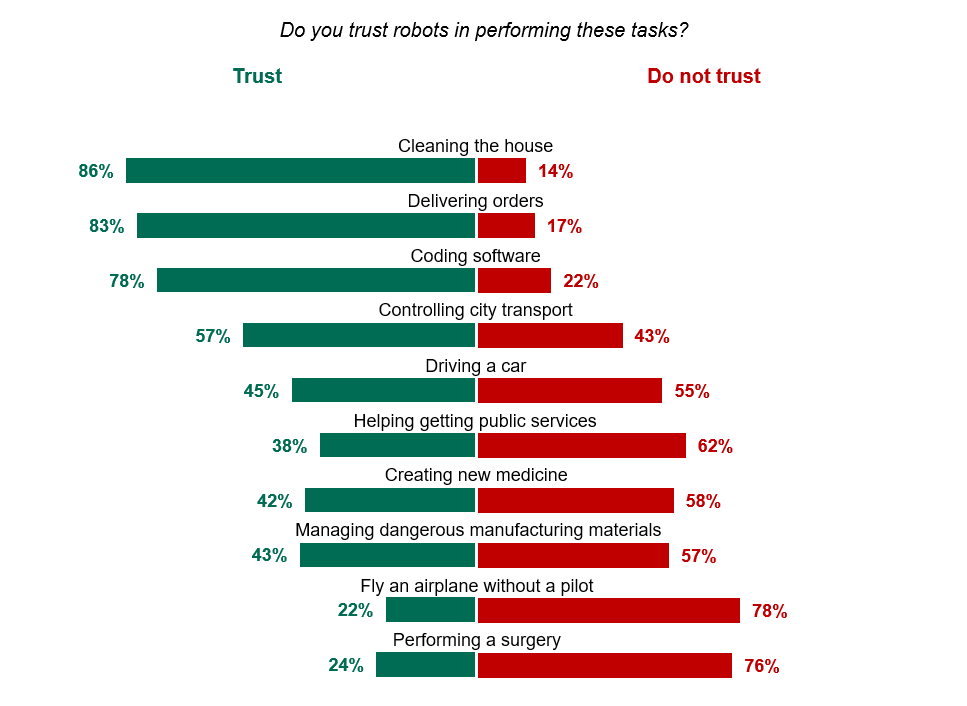According to recent Kaspersky research*, employees in the Middle East, Turkiye and Africa region (META) trust robots in performing ordinary tasks in logistics, transportation, and cleaning. But they were less willing to trust robots with life critical functions, such as performing surgeries, flying airplanes without pilots, managing dangerous manufacturing or pharmaceutical production. One of the reasons for the lack of trust to robots is the belief that robots are prone to cyberattacks: this point of view is supported by 3 out of 4 employees surveyed in South Africa (73%).
Employees see robots fit to perform some duties, but unfit for others. For instance, in South Africa 86% of those surveyed trust robots to do cleaning, 83% trust them in delivering parcels and orders. At the same time, less than half of employees would trust robots in such tasks as managing dangerous manufacturing (43%), and only 24% of local respondents trust robots to perform a surgery. These concerns can be explained by the fact that 70% of all employees point out it’s unclear who bears responsibility if robots fail in their duties due to an equipment malfunction or a cyberattack. And 50% of employees believe that if robots malfunction, they can cause physical threat to humans.

“Today robotics are used together with industrial control systems and other information technology to handle production processes, replacing manual labour and improving efficiency, speed, quality and performance. Our research shows a split in employees’ opinion on the duties that robots are fit to carry out. While employees in general are ready for robots to perform unskilled duties, such as cleaning and order delivery, the majority are not ready to trust robots with critical functions which, if done wrong, could cause financial damage or be a physical threat to humans,” comments Emad Haffar, Head of Technical Experts at Kaspersky. “From January to September 2022 malicious objects were blocked on 38% of ICS computers in the Middle East, Turkiye, Africa region that were protected by Kaspersky solutions, according to Kaspersky ICS CERT statistics. We predict that the number of attacks on robots in different industries may increase due to the continuing digitisation.”
To keep your systems protected from various threats, Kaspersky experts recommend:
- Conducting regular security assessments of OT systems to identify and eliminate possible cyber security issues.
- Establishing continuous vulnerability assessment and triage as a base for effective vulnerability management process. Dedicated solutions like Kaspersky Industrial CyberSecurity may become an efficient assistant and a source of unique actionable information, not fully available in public.
- Performing timely updates for the key components of the enterprise’s OT network; applying security fixes and patches or implementing compensating measures as soon as it is technically possible is crucial for preventing a major incident that might cost millions due to the interruption of the production process.
- Using Industrial EDR solutions such as Kaspersky Industrial Cybersecurity for Nodes with EDR for timely detection of sophisticated threats, investigation, and effective remediation of incidents.
- Improving the response to new and advanced malicious techniques by building and strengthening your teams’ incident prevention, detection, and response skills. Dedicated OT security trainings for IT security teams and OT personnel is one of the key measures helping to achieve this.
Reference:
* Kaspersky conducted a study to learn the opinion of employees of manufacturing companies and other large organizations around the world about the consequences of automation and increased use of robots. The goal was to see what employees think about the security of robots and automated systems. The survey included respondents from Saudi Arabia, UAE, Turkey, Egypt, and South Africa.
